The Gospel of Mark points out something very interesting. When referring to Himself, Yeshua (Jesus) uses the term “Son of Man” instead of Messiah. We’re going to do a cultural expectation study about what the term Messiah had come to mean to first-century Jews and talk about why Yeshua instead chose the more obscure title “Son of Man.”
Transcript below:
************************
Sometimes there arises a bit of manufactured controversy over the fact that Yeshua/Jesus didn’t really use the term “Messiah” to describe Himself but instead used the phrase “Son of Man.” In fact, when describing Himself He almost exclusively uses “Son of Man” and we mostly only see the word Christos pop up in the mouths of others, many of the instances being editorial references after the fact instead of directly coming out of the mouths of the disciples and crowds to whom He preached. So today we are going to tackle this subject—Son of Man vs Messiah, and figure out why Yeshua used the one and not the other. Don’t worry, it will make sense. The explanation is really very simple.
Hi, I am Tyler Dawn Rosenquist and welcome to Character in Context, where I teach the historical and ancient sociological context of Scripture with an eye to developing the character of Messiah. If you prefer written material, I have five years-worth of blog at theancientbridge.com as well as my six books available on amazon—including a four-volume curriculum series dedicated to teaching Scriptural context in a way that even kids can understand it, called Context for Kids—and I have two video channels on youtube with free Bible teachings for both adults and kids. You can find the link for those on my website. Past broadcasts of this program can be found at characterincontext.podbean.com.
Most verses this week are taken from the TLV Bible, the Tree of Life Version.
So, before we delve into Son of Man vs Messiah, I want to address the Greek word “christos” which has been branded in some circles as pagan and there is quite a bit of bullying over the use of the term. Let’s just set the record straight, shall we?
We need to stop being afraid of words and we need to stop being intimidated by those who label everything as pagan but without anything but wild stories backing it up – there are people out there who want to outlaw just about every word that has been associated with Christianity, sometimes making up preposterous stories about pagan origins –– how about “Christ.” I was looking at the Septuagint a number of years ago and found this in Habakkuk.
**
Habakkuk 3:13 in the Septuagint – referring to the Messiah as the ‘anointed’ – the word is christos. The Septuagint (translation began during 3rd century BCE and was completed roughly 132 BCE) was translated by a group of 70 (or 72) great Torah scholars who were fluent in Greek, and is an incredibly useful tool for the understanding of what words meant in context at the time. Many quotes from the Tanach (OT) by the NT authors were actually taken from the Septuagint version, which is why they do not match up perfectly with the Hebrew. Evidently, the scholars saw no problem with using the word christos in Messianic verses so it cannot possibly be an inherently ‘pagan’ word. Just ask any Jewish friend of yours and they will readily admit that getting 70 Jewish scholars to agree on something is a miracle! And in fact, they agreed to translate Maschiach, the Hebrew word translated into the modern English Messiah into the Greek Christos all 39 times it appears in the Septuagint.
ἐξῆλθες εἰς σωτηρίαν λαοῦ σου τοῦ σῶσαι τοὺς **χριστούς** σου ἔβαλες εἰς κεφαλὰς ἀνόμων θάνατον ἐξήγειρας δεσμοὺς ἕως τραχήλου διάψαλμα
Thou wentest forth for the salvation of thy people, even for salvation with thine **Christos (anointed);** thou woundedst the head out of the house of the wicked, by discovering the foundation unto the neck. Selah.
Psalm of Solomon 17:32 (Pseudopigraphic (false name) Jewish Wisdom Literature – first or second century BCE)
καὶ αὐτὸς βασιλεὺς δίκαιος διδακτὸς ὑπὸ θεοῦ ἐπ᾽ αὐτούς καὶ οὐκ ἔστιν ἀδικία ἐν ταῖς ἡμέραις αὐτοῦ ἐν μέσῳ αὐτῶν ὅτι πάντες ἅγιοι καὶ βασιλεὺς αὐτῶν **χριστὸς** κυρίου
And he will be a righteous king over them, taught of God. And there shall be no unrighteousness in his days in their midst, for all shall be holy and their king the Lord **Christos (Messiah).**
Apart from the word woundedst, which is an offensive assault on our modern ears, there is nothing terrible going on here. Christos is obviously a completely legitimate non-pagan word that was in use among the Jews long before the first century because it simply means anointed one, like Elohim means mighty one, adon means lord, baal means master. It is only the context that determines whether the specific usage is pagan, not the word itself.
Demonizing words is a form of online terrorism, guys. Let it go. We have to stop policing each other and looking for things to hate because it compromises our integrity. If you are interested in more of these little tidbits debunking some of this stuff, check out the section of my blog theancientbridge.com in the section entitles “Challenging the Memes.” I have a lot of stuff in there debunking the pseudo-archeological claims being passed around as facts on memes that are actually pure propaganda.
But, back to the terms Son of Man and Messiah.
By the time the first century had rolled around, the word Messiah had become very laden with meaning after having very little meaning throughout the Hebrew Scriptures. There are many maschiach in Scripture, it is a word generally used to describe the ones anointed with the holy oil—kings and high priests as well as prophets. Cyrus is even called a maschiach in Isaiah 45:1. And then the term is also applied sometimes to things like the altar or the bread offerings. But by the time of Yeshua, there was an additional concept, specifically THE Messiah. Messiah as a proper noun instead of as a descriptive word. Messiah became a person, sometimes two people, but a solid identity laden with external meanings and expectations. To claim to be the Messiah in the first century meant certain things—political things. It was, frankly, so weighed down with meaning that the word was almost unusable. To be the Messiah carried with it certain unreasonable expectations that were nonetheless firmly embedded in the Jewish identity and dialogue of the times. Everyone had very unshakeable ideas about what the Messiah would do.
Yeshua didn’t come to do what they expected in the ways they expected Him to do it. He wasn’t the Messiah that they wanted or were looking for—He was, however, the Messiah that they and the world needed.
It is popular within the Hebrew Roots and Messianic movements to teach about the Messianic expectations of His time—some of which we know from writings contemporary to His day, like the concepts of the Davidic warrior Messiah in 4QFloregium, and the prophetic Messiah of The War Scroll—found among the documents recovered from the vicinity of Qumran. The Damascus Document makes specific reference to the Messiahs of David and Israel, kingly and priestly. The earlier Pseudopigraphic Testaments of the Patriarchs contain references to a kingly ruler and a priestly ruler, but the term Messiah is not yet seen. Then there arose later the motif of the Suffering Servant Messiah, possibly written about first by early Christians and then later by Jewish sources like Pesikta Rabatti, where he is called Ephraim. But, in the first century, Messiah was inextricably tied to the concept of the deliverance of the people of God from foreign oppression. As Nehemiah pointed out in his covenant renewing prayer, in Chapter 9:
36 Behold, we are slaves this day; in the land that you gave to our fathers to enjoy its fruit and its good gifts, behold, we are slaves. 37 And its rich yield goes to the kings whom you have set over us because of our sins. They rule over our bodies and over our livestock as they please, and we are in great distress.
Although there was a brief respite from foreign rule during the times of the Hasmonean priest-kings, they were forced to turn to foreign powers once again due to infighting. So really, they had just continuously exchanged one slavemaster for another—the Babylonians, Medes, Persians, Greeks, and finally the Romans. The Jews of Yeshua’s day were longing for salvation from sins, a formal wiping clean of their national sins before God, where He would forgive them, provide a deliverer, and free them from being ruled over by oppressive pagans. Then they would be self-ruled under a Davidic monarchy once again, and under a true priesthood—as no one was particularly happy with the Temple leadership of Jerusalem. The Sadducees were just Roman cronies, getting rich and turning the Temple of God into a den of thieves. The high priestly family was disgustingly wealthy, owning the rights to all the little shops that lined the western wall and the area atop the southern steps to each side of the Huldah gates. To them, the high priesthood was a business venture—which is why they are the butt of several very nasty parables.
So, the Jews were desperate for a change in conditions. Unlike the Jews who remained in Babylon, they were impoverished, by and large. Year after year, more Jewish landowners were losing their property under the weight of oppressive Roman/Herodian taxation, on top of the 20% owed in tithes. Life expectancy was short, it was just awful. By the time the average Jew in the Roman empire reached 30, which was unlikely at birth, they were riddled with parasites, lice, they were malnourished, etc. Life was bad. Like Nehemiah said, they were slaves in their own land, giving their produce to foreign overlords and just managing to survive. The collaborators and educated and slaves were a lot better off, but the people of the Land were in a terrible state.
They needed salvation, deliverance and were looking toward the long-awaited supremacy over the pagan gentiles. They were waiting for Messiah, but Messiah wasn’t the type of Messiah they were longing for.
Let’s take a quick look at where and how the term Messiah, Christos, appears in the Gospels.
In Matthew, it appears 15 times, almost always as a narrative term from the author describing Yeshua from the outside. For example, Matthew 1:17 “So all the generations from Abraham to David are fourteen generations, from David until the Babylonian exile are fourteen generations, and from the Babylonian exile until the Messiah are fourteen generations.”
Mark has six occurrences, Luke 8 and John 17—and it is mostly the same thing—the word is used narratively to describe Him years later, and not generally coming out of people’s mouths although in John, John the Baptist uses it a few times in order to assure people that he himself is not the Messiah.
The Synoptics all record once incident, however and I will read the account in Matthew 16 (we also see it written in Mark 8 and Luke 9)
13 When Yeshua came into the region of Caesarea Philippi, He asked His disciples, “Who do people say that the Son of Man is?”
14 They answered, “Some say John the Immerser, others say Elijah, and still others say Jeremiah or one of the other prophets.”
15 He said, “But who do you say I am?”
16 Simon Peter answered, “You are the Messiah, the Son of the living God.”
17 Yeshua said to him, “Blessed are you, Simon son of Jonah, because flesh and blood did not reveal this to you, but My Father who is in heaven! 18 And I also tell you that you are Peter, and upon this rock I will build My community; and the gates of Sheol will not overpower it. 19 I will give you the keys of the kingdom of heaven. Whatever you forbid on earth will have been forbidden in heaven and what you permit on earth will have been permitted in heaven.” 20 Then He ordered the disciples not to tell anyone that He was the Messiah.
Peter identifies Him, Yeshua praises him, He warns them all not to reveal His identity—and we will talk about why at length as we go through the Gospel of Mark over the course of the next year—and then, of course, He immediately puts the smackdown on Peter in the next passage for protesting Yeshua’s prediction of his own death. Man oh man, I feel like Peter a lot of the time—always putting my foot into my mouth.
At His trial, he is straight-up asked whether or not He is the Messiah and He will only say, “You said it” and then immediately makes reference to the Son of Man—which we will get to in a minute. This enrages the chief priests because they know exactly what He is talking about. Matthew 26:
63The kohen gadol said to Him, “I charge You under oath by the living God, tell us if You are Mashiach Ben-Elohim!”
64 “As you have said,” replied Yeshua. “Besides that, I tell you, soon after you will see the Son of Man sitting at the right hand of power and coming on the clouds of heaven.”
65 Then the kohen gadol tore his clothes and said, “Blasphemy! Why do we need any more witnesses? Look, you’ve heard the blasphemy. 66 What’s your verdict?”
“Guilty,” they answered. “He deserves death!” 67 Then they spat in His face and pounded Him with their fists. Others slapped Him and demanded, 68 “Prophesy to us, you Messiah! Which one hit You?”
So why were they so furious at this reference? Well, let’s explore the term “Son of Man” to find out. After all, it seems kind of a tame thing to call oneself compared to Messiah, which impresses us much more, right? Well, the Messiah wasn’t really presumed to be a divine figure—when we look at the text, we need to realize that we don’t see things looking back the same way they saw things at the time—how could they? 20/20 hindsight is a pretty great thing we have that they didn’t.
But anyway, back to the story—and enter the phrase Son of Man. Now, the Son of Man pops up all over the place in Ezekiel, meaning simply “human being” when applied to Ezekiel but it appears twice in Daniel, once in the exact same way it appears in Ezekiel, simply meaning “human being” as pointed at Daniel himself and of course the famous occurrence in chapter seven which we will read right now because this passage is the one that inspired Yeshua’s labelling of Himself as the Son of Man.
9“While I was watching,
thrones were set up,
and the Ancient of Days took his seat.
His garment was as white as snow,
and the hair of His head like pure wool.
His throne was ablaze with flames,
its wheels a burning fire.
10 A river of fire was flowing and coming out from before Him.
Thousands of thousands attended Him
and ten thousand times ten thousand stood before Him.
The court was seated,
and the books were opened.
11 “I kept watching because of the boastful words that the horn was speaking. I continued watching until the beast was slain and its body destroyed and thrown into the blazing fire. 12 As for the rest of the beasts, their dominion had been taken away, yet their lives were prolonged for a season and a time.
13 “I was watching in the night visions.
Behold, One like a Son of Man,
coming with the clouds of heaven.
He approached the Ancient of Days,
and was brought into His presence.
14 Dominion, glory and sovereignty were given to Him
that all peoples, nations, and languages should serve Him.
His dominion is an everlasting dominion that will never pass away,
and His kingdom is one that will not be destroyed.
So obviously, this designation of the Son of Man isn’t less controversial than Messiah, it was just not overused at this point. When Yeshua called Himself the Son of Man, He was either claiming to be the second figure in the throne room of God or just a normal guy. A normal guy who heals the sick, raises the dead, casts out demons at will, claims to forgive sin, cleanses lepers, restores the lame and blind from birth, multiplies food, creates wine out of water and commands the wind and sea. You know, just a normal guy, right? Not so much.
If an angel came down and said to you or I, “son of man” they would be saying “Yo, dude…” but Yeshua was laying claim to be THE Son of Man—more than the Messiah. Folks weren’t sure if the Messiah would be divine or not, it was very controversial. A lot of the verses and especially in Isaiah talk about God Himself coming to save His flock, shepherd His flock, etc. This was hard for the ancient readers to reconcile—how can God, who has no form, who exists as spirit, come down and save His people and yet we have all these strange occurrences in the Hebrew Scriptures of people seeing God and living—most notably the time where Abraham met the three “men”—one of whom speaks to Abraham in such a way that He is obviously God. It was quite the dilemma.
Anyway, we see from Daniel a claim greater than simply being a human being—this “One like a Son of Man” comes into the presence of God and is given authority. “Dominion, glory and sovereignty were given to Him that all peoples, nations, and languages should serve Him. His dominion is an everlasting dominion that will never pass away, and His kingdom is one that will not be destroyed.”
But more than that, go up to verse 9—“thrones were set up, and the Ancient of Days took His seat.” Whoa there, multiple thrones. Rabbi Akiva made a stunning pronouncement about the multiple thrones in the second century:
The Gemara poses another question: One verse states: “His throne was fiery flames” (Daniel 7:9), and another phrase in the same verse states: “Till thrones were placed, and one who was ancient of days sat,” implying the existence of two thrones. The Gemara answers: This is not difficult. One throne is for Him and one is for David, as it is taught in a baraita with regard to this issue: One throne for Him and one for David; this is the statement of Rabbi Akiva. Rabbi Yosei HaGelili said to him: Akiva, how long shall you make the Divine Presence profane, by presenting it as though one could sit next to Him? Rather, the two thrones are designated for different purposes: One for judgment and one for righteousness. (BT Chaggiga 14a)
Now this was, of course, long after the resurrection. Akiva was taking a huge risk in even suggesting that “David” (another code name for the Messianic king) could sit next to God on His throne. However, Akiva is considered one of the greatest Rabbinic minds of all time. He was born a pagan and converted and became a great Torah scholar—if he had not wrongly chosen and declared Bar Kochba to be the Messiah, who knows how history might have been different. But he clearly saw what Yeshua saw—two thrones in Heaven one for the Father and one for the “Son of Man” to sit beside Him, the Messiah, “David the King” or “The Branch” as He is also called in Scripture—the prophet like Moses, etc. Akiva’s contemporaries were not amused—but it was for backing the false Messiah Bar Kochba during the early second century that it was executed, not for this.
How many times in the Gospels is Yeshua recorded as describing Himself and/or His actions/or future events with the term Son of Man? Twenty-eight times in the Gospel of Matthew, thirteen times in Mark, twenty-five times in Luke, and twelve in John.
9 Which is easier, to say to the paralyzed man, ‘Your sins are forgiven,’ or to say, ‘Get up, and take your mat and walk’? 10 But so you may know that the Son of Man has authority to pardon sins on earth…” He tells the paralyzed man, 11 “I tell you, get up, take your mat and go home!” (Mark 2:9-11)
27 Then He said to them, “Shabbat was made for man, and not man for Shabbat. 28 So the Son of Man is Lord even of Shabbat.” (Mark 2:27-28)
For whoever is ashamed of Me and My words in this unfaithful and sinful generation, the Son of Man will also be ashamed of him when He comes in the glory of His Father with the holy angels!” (Mark 8:38)
12 Now He told them, “Indeed Elijah comes first; he restores all things. And how is it written that the Son of Man must suffer much and be treated with contempt? 13 I tell you that Elijah has come, and they did to him whatever they wanted, just as it is written about him.” (Mark 9:12-13)
He was teaching His disciples and telling them, “The Son of Man is going to be delivered into the hands of men, and they will kill Him. And after He is killed, three days later He will rise up.” (Mark 9:31)
He said, “Look, we are going up to Jerusalem, and the Son of Man will be handed over to the ruling kohanim and the Torah scholars. They will condemn Him to death and hand Him over to the Gentiles. (Mark 10:33)
For even the Son of Man did not come to be served, but to serve, and to give His life as a ransom for many.” (Mark 10:45)
And He comes the third time and says to them, “Are you still sleeping and taking your rest? Enough! The hour has come. Look, the Son of Man is being delivered into the hands of sinners. (Mark 14:41)
Commonly, Yeshua uses the phrase “Son of Man” to describe Himself in the midst of a controversy, in order to respond to someone who has challenged His authority to do something—like forgive sins, pluck heads of wheat on the Sabbath, heal on the Sabbath, teach with self-proclaimed authority and not as the Scribes did, etc. Although He uses it in the third person instead of the first person, it is always talking about what He has just done or what will soon (or even immediately) happen to Him.
Messiah, on the other hand, is used by others—and especially narratively by the Gospel writers—to describe Him. We see how Peter used it when Yeshua asked, “Who do people say I am” and He didn’t correct Peter and say, “I am Not the Messiah, how can you be so dense?”. But after His resurrection, Yeshua uses it as well.
25 Yeshua said to them, “Oh foolish ones, so slow of heart to put your trust in all that the prophets spoke! 26 Was it not necessary for Messiah to suffer these things and to enter into His glory?” 27 Then beginning with Moses and all the Prophets, He explained to them the things written about Himself in all the Scriptures. (Luke 24:25-27)
In this case, He uses it exactly the way He had previously used the term Son of Man.
45 Then He opened their minds to understand the Scriptures, 46 and He said to them, “So it is written, that the Messiah is to suffer and to rise from the dead on the third day, 47 and that repentance for the removal of sins is to be proclaimed in His name to all nations, beginning from Jerusalem. 48 You are witnesses of these things. 49 And behold, I am sending the promise of My Father upon you; but you are to stay in the city until you are clothed with power from on high.” (Luke 24:45-49)
Now, of course, once we get past the Gospels, we almost never see the phrase Son of Man—Stephen utters it during his vision of Yeshua at his trial, which was the final straw before they rushed on him and stoned him.
And he said, “Look, I see the heavens opened and the Son of Man standing at the right hand of God!” (Acts 7:56)
Why were they furious? Well, Stephen just repeated what Yeshua said at His trial—which resulted in Yeshua’s conviction on blasphemy charges, making Himself equal to God as the second figure of Daniel 7. Remember how Rabbi Akiva’s contemporaries were angry when he brought up the same idea?
The only other place we see Son of Man is in Revelation 1:13
In the midst of the menorot, I saw One like a Son of Man, clothed in a robe down to His feet, with a golden belt wrapped around His chest.
Of course, this is describing Yeshua, as the proper name for this book is the Revelation of Yeshua the Messiah, Jesus the Christ. Otherwise, He is described everywhere as Messiah, messiah, messiah over and over again—hundreds of times not just by Paul but also by James (his brother), John, Peter and Jude (also his brother). We also see the terms Son of God (ben Elohim in Hebrew), Savior, etc. But overwhelmingly we see the Greek Christos, shorted to Christ in English, which was the translation of the Hebrew Maschiach, rendered later in Greek as Messias.
Next week we will be starting with Mark 1:1 and talking about what the Gospel is and what is the Greater Exodus.

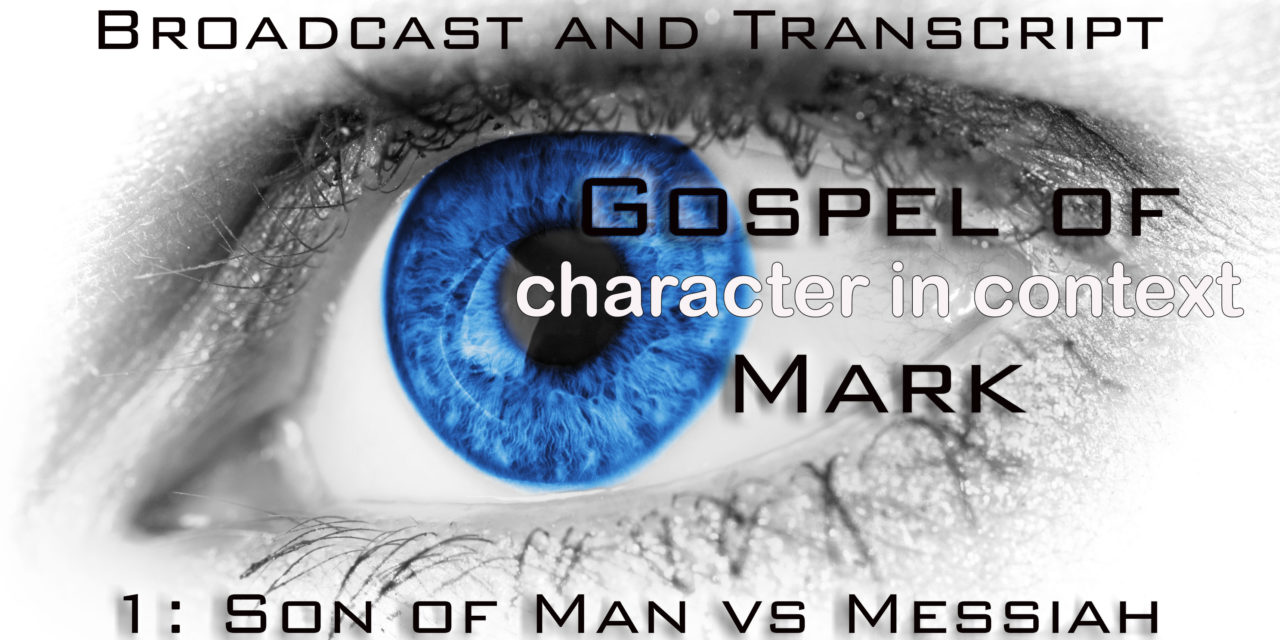


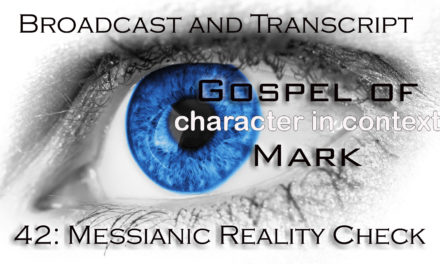
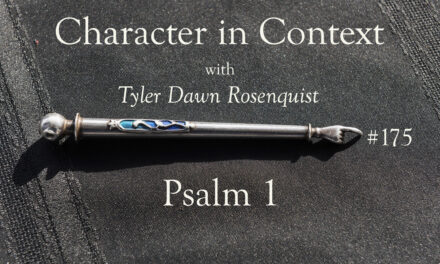
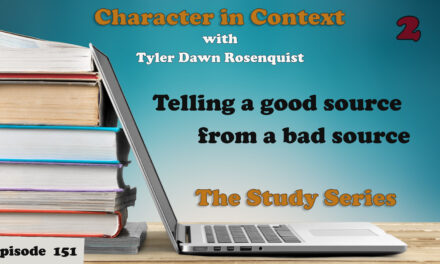
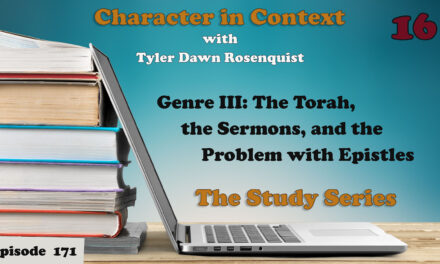














TYLER, thank you! Isaiah was well worth the study, imo. I love your mind! shalom